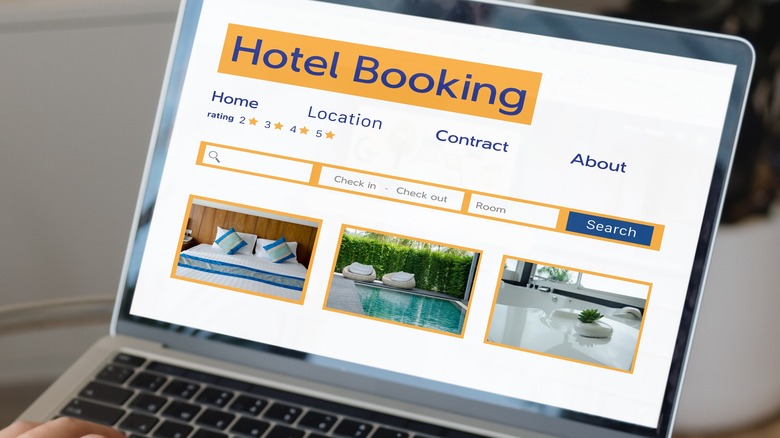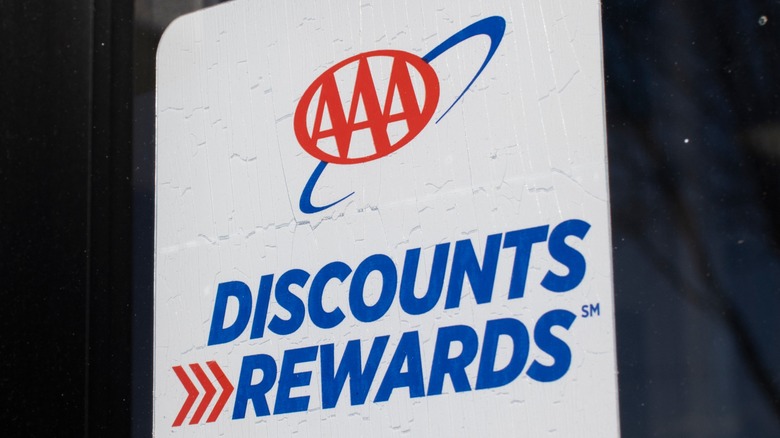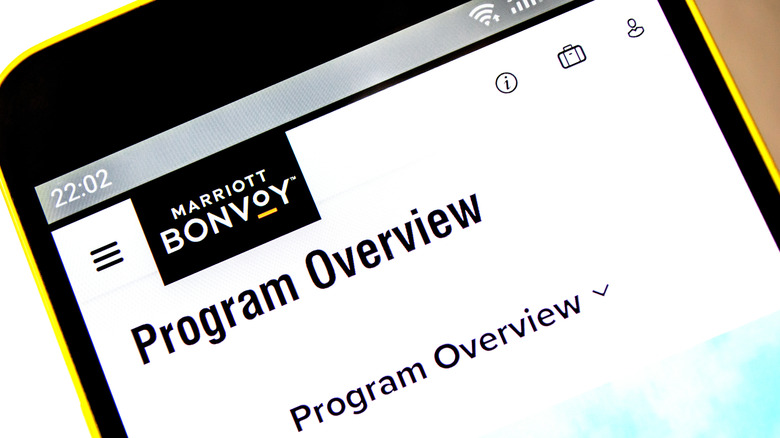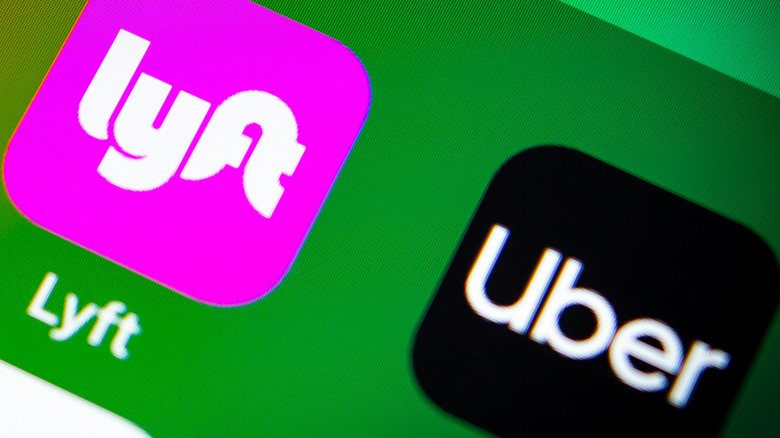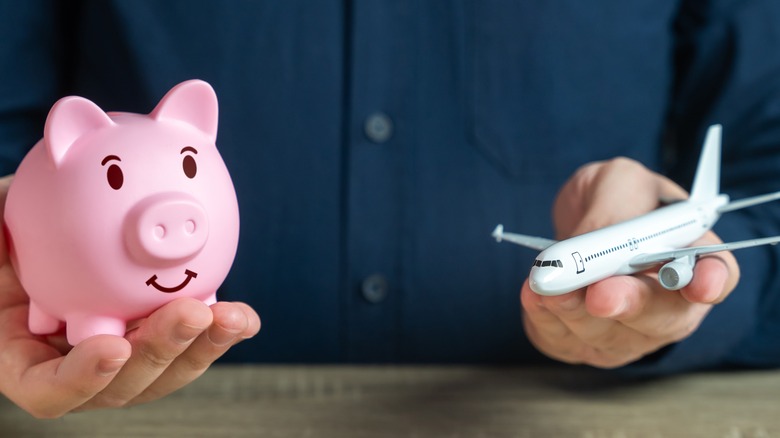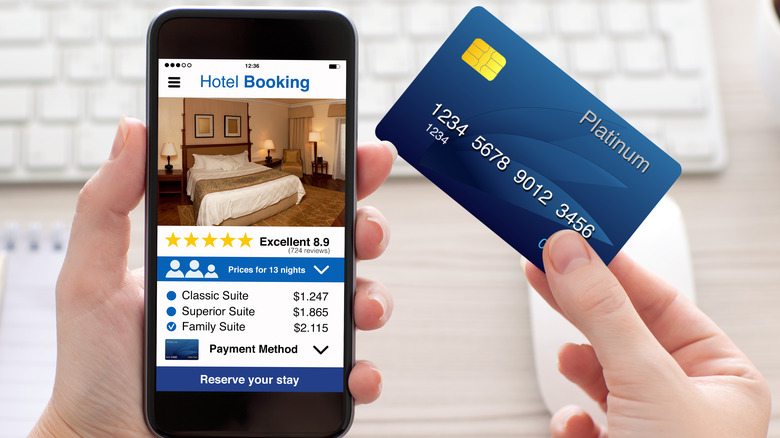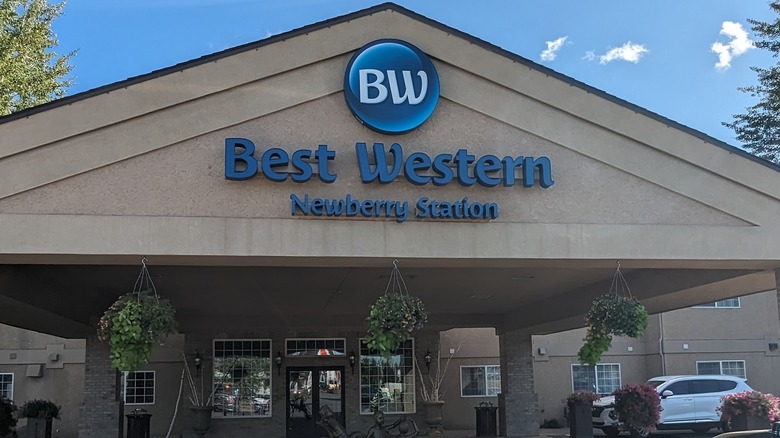Tips That Can Get You A Smoking Deal On A Hotel Room
Planning a trip can be inspirational, at least until you look at the bottom line. Hotel stays can be pricy, but it is possible to get great deals if you're willing to plan ahead and do some digging rather than just snapping up the first available rate you find online. There are a lot of options for scoring rock-bottom prices on hotel stays, from choosing your travel dates when prices are at their lowest to identifying creative ways to rack up points in hotel loyalty programs and more. The type of hotel you select impacts the price, as does whether you book directly with a hotel or use a corporate website, online travel agency (OTA), or reservation number.
Ready to crack the code for finding incredible deals on hotel rooms? These tried and true tips and tricks will help you to secure a great rate on your next hotel stay.
Look at hotel rates before finalizing travel dates
When you're in the market for a great hotel rate, flexibility is your friend. Hotel rates vary based on occupancy, which means that you'll be able to get the best possible price if you schedule your trip when the hotel is likely to be as un-busy as possible. Sure, off-season rates are lower than peak travel season, but that's not the only factor that can impact hotel occupancy (and prices). Hotel prices can be high due to non-tourist season activity, such as weddings, conventions, trade shows, sports tournaments, concerts, out-of-town workers, and more.
This is why it's a good idea to get a sense of what rates are like before you finalize your travel dates. Taking the time to check hotel rates across several different weeks can help you identify the timeframe with the lowest rates. Otherwise, you could accidentally book your trip at a time when room rates are extremely high due to occupancy. Rates are often at their lowest occupancy (with the cheapest rates!) immediately after major holidays.
Consider package options when booking
When you're searching for hotel rates, be sure to look at any package deals the properties you're considering might offer. Sure, packages cost more than room nights alone — but they often include items that you would otherwise purchase (and pay more for) as add-on items. For example, if you're traveling by car and the hotel charges for parking, then you're going to incur an overnight parking fee. When comparing rates, look to see if any of the properties you're considering offer a park & stay package. If so, it's probably cheaper than the sum of the hotel's lowest rate and the cost of parking overnight.
Hotel packages aren't limited to room and parking bundles. Some properties offer packages that include a certain number of meals, spa treatments, attraction tickets, and more. As long as a package includes things you'll purchase anyway, booking one can be a great way to get the most for your travel money.
Check hotel rates in incognito mode
If you're doing a lot of internet searches related to hotel stays, browsing incognito can help you make sure you're getting the best rate. This is because companies (including hotels) can keep track of your search history and use that information to bump up prices a bit each time you visit their site. Incognito browsing can allow you to see what rates look like when your search history doesn't factor into the results. For this to work, though, don't log into your loyalty account with the hotel while you're pulling up rates via the incognito browser, as doing that will reveal information about your travel habits. Get the rates first, then log in immediately before booking.
The results you get via incognito browsing won't always be better — they may be the same or even higher. To make sure you're getting the best rate it's a good idea to check hotel rates in one browser using incognito mode, and then pull up the same search in another browser where you are logged in as yourself. If the prices don't match, you'll be able to benefit by booking via the browser tab that shows the best possible rate.
Call the hotel directly to book
Going incognito isn't the only way to try to secure a lower rate. Sometimes your best bet is to do a web search to decide where you want to stay, but then call the hotel property directly when you're ready to book. Ask for the property's best rate for the type of room you need. You may find that it's better than what you found online, whether you were browsing incognito or not. If the rate isn't better, let them know what price you found online and ask if they have any options for a lower rate. Be polite, and you might be pleasantly surprised by the results.
Most branded hotels are franchises, which means they're owned by individuals or companies that pay a franchise fee to operate under the corporate hotel brand. In addition to paying a percent of overall revenue to the brand, franchise owners also have to pay an additional sales or reservation fee for guests who book via the corporate website or central reservation phone line. Depending on the brand, this fee can range from just under half a percent to over 2%. When you book directly, the property owner doesn't have to pay a corporate sales or reservation fee. Some of that savings may be passed on to you.
Tentatively book refundable stays to hold a good rate
When you find a good hotel rate, it's a good idea to go ahead and make a refundable reservation while you're finalizing your travel plans. This is because the hotel will increase prices as other bookings are made, so the price can change very quickly. For example, say you search to identify the timeframe during which you can get the best rate and decide to ask for corresponding days off from work. If you hold off on booking until after you get your vacation days approved, you may find that the price isn't quite so favorable when you return to make a reservation.
So, as long as the hotel offers a refundable option, don't let the fact that your travel plans are still tentative stop you from making a reservation when you find a good deal. Otherwise, you may find that the price is much higher when you return to the site to book a room. Just be sure to cancel if you decide not to go to avoid having to pay a no-show fee.
Keep searching for even better rates
Once you've locked in an acceptable refundable rate, you could stop there and stick with the choice you've made. However, if you're determined to find the best possible deal, you don't have to let a little thing like a refundable reservation stop you from continuing to look for a better deal. If occupancy stays low, keep looking. Your continued diligence may help you score a better price than the one you already booked. As long as there is still time to cancel the initial reservation without incurring a fee, you're free to book another room and cancel the one that you've been holding.
If you go this route, make sure you're fully aware of the exact deadline to cancel your original reservation. Depending on the property and type of deal you booked, you may be able to cancel up to the day of arrival but that's not always the case. Some cancellation policies require several days' notice. You don't want to get stuck paying for multiple reservations, so proceed with caution.
Invest in a AAA membership
Many hotels offer discounts to AAA members, so becoming a member can be a good way to qualify for reduced pricing on hotel rooms. Before investing in AAA membership, check to see if the hotel brands you prefer offer lower rates for AAA members. The best way to find out is to look in the "special rates" (or similar) category when searching for rates via a hotel's website. The lowest membership tier costs around $60 per year, and AAA a hotel discount (where available) usually takes about 10% off standard rates.
Do the math to see if you travel frequently enough to save more than the cost of the discount. If you do, then joining AAA is well worth the cost. Keep in mind that hotel discounts aren't the only benefit. AAA members also get roadside assistance and discounted admission at some tourist attractions, adding even more value to your membership. If you travel frequently and want to be able to regularly book hotel rooms for the lowest possible rate, then joining AAA can be a worthwhile investment.
Consider overall value rather than just room rate
When looking at hotel rates, the per-night cost isn't the only factor that impacts the value you're getting for your money. If you look only at the per-night rate when making a decision, you could be surprised by extra charges when you arrive at the hotel. It's best to thoroughly check out a hotel's policies and amenities before making a decision solely based on the per-night fee.
For example, some hotels add on a resort fee or an amenity fee that isn't revealed at the time of booking. As a result, a hotel that charges a resort fee may incorrectly appear to be a better deal than a property with a slightly higher rate but no resort fee. It's a good idea to get into the habit of checking a hotel's website to see if there is a resort or amenity fee or to call the property and ask. Free parking is also worth a chunk of change, and a hotel that offers free breakfast and/or an evening happy hour reception can help cut down on your travel-related food costs.
Maximize hotel points with your favorite chains
It's a good idea to sign up for the loyalty program for every hotel brand you use, as membership in these no-cost programs often provides benefits beyond points accrual. Some offer special rates just for loyalty program members, while others provide no-cost Wi-Fi upgrades or special offers just for members. To make the most of these programs toward the end of earning reduced cost — or even free — room nights, though, it's a good idea to make a concerted effort to build points toward awards nights with just a few of your very favorite brands rather than spreading out your stays across many different hotel chains.
It may not always be possible to book your preferred brand, due to a lack of availability or favorable rates somewhere else. In that case, of course, it's fine to stay with a different hospitality brand. Sticking with one (or just a few) hotel chains whenever possible will help you earn points toward free or reduced rooms faster, and will also help you make progress toward higher status levels that provide additional perks (such as exponential points earning, free breakfast or beverages, or complimentary early/late check-in) that can help you save even more money.
Link your rideshare accounts to a hotel loyalty program
You can likely earn points that can be applied toward free or reduced hotel stays via Lyft and Uber. If you take rides with one or both of these services or have food delivered via Uber Eats, the money you spend with them can actually help you earn rewards points with some of the largest and most popular hotel brands in the world. It's as simple as linking your Marriott Bonvoy loyalty account to your Uber account and connecting your Hilton Honors membership to your Lyft account.
Once your rideshare accounts are connected to these hotel rewards programs, you'll automatically earn hotel points every time you use these services. What a super-easy way to earn points that can help offset the cost of future hotel stays. Programs like this emphasize how beneficial hotel reward programs can be, even for those who don't stay in hotels very often.
Convert unused airline miles to hotel points
If you fly occasionally, but not enough to accrue enough miles for a free plane ticket, those miles may still have value toward helping you offset the cost of future travel. Some airline miles programs are set up to allow customers to convert unused airline miles to hotel points. For example, Mariott Bonvoy members can convert miles from United Airlines, Hawaiian Airlines, and several overseas airlines to hotel points. The Accor Hotels rewards program is another option; it allows members of the Accor Live Limitless (ALL) loyalty program to convert miles from Qantas, AirFrance-KLM, Finnair, and other overseas airlines to hotel points.
Not all miles-to-hotel-point programs are specific to a particular hotel brand. For example, Hawaiian Airlines also allows customers who book hotel stays through its website — which features thousands of hotels and resorts around the world — to redeem miles they've earned via the airline toward the cost of room nights.
Earn free stays faster with a travel reward credit card
If you have the discipline to pay off a credit card bill every month, a travel rewards credit card can help you earn points toward free hotel stays. Several major hotel chains offer branded credit cards that offer rewards in the form of loyalty program points for every purchase made on the card. Some even provide a free hotel night when the card is renewed, which more than offsets the annual fee. Brand-specific hotel cards can be a great option for people who want to maximize hotel rewards with a particular brand, but it's not the only option. Some credit cards offer across-the-board travel rewards, which allow users to directly apply purchase-based points to pay for hotel stays or other travel expenses.
Of course, a credit card that offers hotel/travel rewards is still a revolving credit account with a high interest rate. Travel points are valuable, but paying interest just to get them is not wise. That's why it's so important to pay off your balance in full every month. If not, you'll incur interest charges that far outweigh any rewards you receive.
Check your employer's perks programs for discounts
If your company offers a workplace discount program like PerkSpot, Tickets at Work, Corporate Offers, or similar, you may be able to get special pricing on hotel rooms by shopping for and booking your room via the dedicated portal. If you have access to this type of program, it's a great idea to always log in and see what kind of special hotel rates may be available before shopping directly with a hotel brand or via another booking platform.
Not sure if your employer offers this kind of program? Ask the benefits specialist or another HR professional. If the company doesn't have this kind of program in place, they may be open to adding it to their list of perks. Many of these programs are cost-free to the employer and they make it possible for employees to save money on travel and many other services and items. You just might come out looking like a superhero to management and coworkers alike for making such a great suggestion.
Use a corporate rate if available to you
Speaking of employer-related travel discounts, there might be another way to save money on your hotel room in relation to where you work. If you work for a large company or even a smaller one that has quite a few road warriors on staff, chances are your employer has a corporate discount code with at least a few hotel chains. If so, depending on the terms of the corporate discount agreements, you might be able to use your affiliation with the company to qualify for a corporate discount, even for travel that isn't specifically related to work. It's certainly worth asking the person in charge of booking your company's travel if such an option is available.
If your employer does have a corporate discount that you can use this way, the next step will be to ask for the discount code to be shared with you. Once you have it, you'll be able to apply it via the hotel's website when you're searching for rooms or mention it to the reservations agent when checking rates by phone.
Stick with mid-range hotels rather than luxury properties
Upscale hotels and resorts are nice, but they often come with very high overnight rates and extra costs, like resort fees and valet parking fees. While you might want to splurge occasionally, it's generally best to stick with mid-range or economy properties when you're looking for the best deal on a place to spend the night. Mid-range hotels like Best Western, La Quinta, Holiday Inn, and other similar properties are likely to have more affordable rates than higher-end properties, while still offering a comfortable home base for your travel needs.
On average, upscale hotels generally cost between $200 and $400 per night, with luxury brands costing even more. Midrange properties typically average between $100 and $200 per night, while the average nightly rate for an economy property is between $50 and $60 per night. A variety of factors can impact cost, such as location, whether it's tourist season, or whether special events are going on in the area. Even so, higher-end properties will have higher rates than others.






